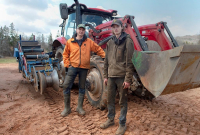Support strong Canadian climate journalism for 2025
Premier Jason Kenney says Alberta and the federal government will cost share a $42-million program to help farmers and ranchers deal with a backlog of cattle waiting to be processed during the COVID-19 pandemic.
"The livestock industry both here in Alberta and across Canada have been affected by the impaired operations of many meat-packing and food-processing plants," Kenney said Thursday. "Critical action must be taken."
He said Alberta will contribute $17 million and Ottawa is expected to fund the balance under an existing cost-shared program.
The money will be used to subsidize producers to hold onto and feed cattle for up to nine weeks to match reduced demand and processing capacity.
Alberta is dealing with outbreaks at three beef-processing facilities, which have forced temporary shutdowns and reduced production.
"The plants, working with Alberta Health Services, have implemented dozens of new screening and containment procedures and protocols," added the premier.
The Opposition NDP has been calling for the United Conservative government to hold a public inquiry into the outbreak at the Cargill plant near High River, citing reports that employees there were coerced into returning to work.
Alberta reported 54 new cases of COVID-19 on Thursday, bringing its total to 6,017 cases. There were two additional deaths, bringing the province's total fatalities from the illness to 114.
At a news conference, Kenney also responded to comments made this week by federal Green parliamentary leader Elizabeth May and Bloc Quebecois Leader Yves-Francois Blanchet, who said post-COVID-19 economic investments should focus not on the oilsands, a staple of Alberta industry, but on renewables.
"Stop kicking us while we're down," Kenney said.
"These attacks on our natural resource industries are unwarranted, they are divisive (and) they are, I believe, in a way un-Canadian at a time like this."
Alberta is relaunching its economy as numbers suggest it is flattening the curve on COVID-19 infections.
Golf courses can now open on a limited basis and dentists, physiotherapists, social workers and other similar health professionals can also resume business, subject to health rules from their professional bodies.
The main economic relaunch, dubbed Stage 1, is set for May 14, with retailers, museums, and barbers and hair stylists allowed to open their doors. Public gatherings are to remain restricted to no more than 15 people.
The NDP held a news conference Thursday with hair stylists and salon owners who said they are worried because they have not received any direction from the province on health, safety and social distancing guidelines for their reopenings.
"I cannot wrap my head around the reasons why we are in Phase 1 instead of Phase 2, where massage therapists are. We both work very closely with clients," said one of the operators, Sharon Stewart.
"I feel like we're the guinea pigs right now. Mr. Kenney has just thrown us to the wolves."
Health Minister Tyler Shandro, responding to NDP questions in the house, said barber shops and hair salons are not required to open May 14, and can follow general workplace health guidelines already issued by the province as health officials continue to get more industry-specific details in place.
"We're recommending operators review (the guidelines and) consider how to apply it to their facility and their businesses," said Shandro.
This report by The Canadian Press was first published May 7, 2020.





Comments